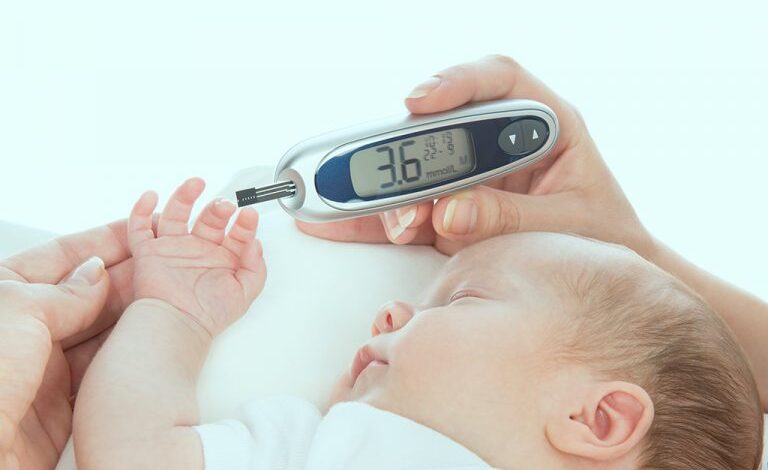Low blood sugar in infants: causes and treatment methods

1
If you are a mother for the first time, it is important that you be aware and have a sufficient amount of knowledge about the signs that your infant may face that will attract your attention because they are abnormal, as some of the changing symptoms that occur in newborns may be noticed by new mothers, which carry significant indicators. They may suffer from low blood sugar, which requires regular monitoring with a pediatrician to prevent the risk of developing health complications. We will monitor in more detail everything that concerns you about low blood sugar in infants.
Low blood sugar in infants


Low blood sugar in infants
When we talk about the state of hypoglycemia in its general sense, we will find that it refers to a state of decrease in sugar level readings to a value less than 50 milligrams/dL, and since it is one of the conditions that different age groups can suffer from, infants also are not It is safe from infection, but do not worry, mother, because it is often linked to a deficiency in sugar reserves, or the child may have been born prematurely or been exposed to pollution. In other cases, it is associated with mothers suffering from diabetes, which has an effect on the newborn.
However, if we move to severe and acute cases of low blood sugar in infants, although they are rare, they are the result of a chronic disorder in the percentage of stored sugars during the birth process or an excessive increase in the production of the hormone insulin.
When your child is born with such a condition in which blood glucose levels are low, this will inevitably lead to him developing a health problem as a result of a defect in the basic energy source on which the body depends. If treatment is neglected, the matter may develop into more serious complications.
Causes of low blood sugar in infants


Causes of low blood sugar in infants
There are many factors causing an infant to suffer from hypoglycemia, which are grouped into a number of reasons as follows:
- When the weight scale proves that there is a decrease in the weight of the newborn to less than 2.5 kilograms.
- If the child is a premature child who was born before the 37th week of pregnancy, that is, before the scheduled date of birth
- The reason may be related to the mother’s own condition and a medical history of diabetes
- A woman’s consumption of certain types of medications, whether during pregnancy or breastfeeding, such as the sulfonylurea group, can lead to
- The newborn is exposed to a state of low body temperature, which subsequently affects the blood sugar level as a result, leading to its decrease.
- It is a symptom associated with some underlying health problems or birth defects, such as Down syndrome and chromosome 18 deficiency syndrome.
- During pregnancy, the mother suffers from a deficiency in one of the main nutrients, which develops into malnutrition
Symptoms of low blood sugar in infants


Symptoms of low blood sugar in infants
Usually, the symptoms of hypoglycemia are not the same in all infants. Rather, there are relative differences between one child and another, depending on the degree of severity of the health condition. However, the most common symptoms have been observed as follows:
- Chills and internal trembling in the infant’s body
- Excessive sleepiness and extreme fatigue unlike usual
- Facing difficulties while breastfeeding the baby
- Yellowing and fading of the newborn’s skin
- Slow heart rate
- Loss of normal ability to breathe
- Convulsions and epileptic seizures
- Muscle weakness
- Lethargy and low energy levels
Diagnosis of hypoglycemia in infants


Diagnosis of hypoglycemia in infants
It is necessary for the infant to undergo some tests after his birth to ensure his health and verify the efficiency of the body’s systems and vital processes. Among these tests must be a test to measure blood sugar levels for a correct diagnosis to detect whether there is a deficiency in its levels or not, in addition to other types of tests. Which the doctor may recommend to rule out any other causative factors.
Treating low blood sugar in infants


Treating low blood sugar in infants
When we reach the treatment stage, we must know that the therapeutic methods used to treat low blood sugar in infants depend on the severity of the child’s condition. In minor cases, mothers may need to follow a simple procedure represented by breastfeeding the child repeatedly, which affects the blood sugar levels and leads to raising them. However, in severe cases in which the infant suffers from chronic low blood sugar, this emergency situation requires that he receive a glucose solution intravenously, with follow-up on the matter with the treating physician.
This means there are two stages of treatment
1- The basic treatment for low blood sugar in infants
As an initial step in mild cases of hypoglycemia in infants, a quick-acting procedure can be followed by giving the child a mixture of glucose and water to take orally.
2-Secondary treatment for low blood sugar in infants
This emergency, as we mentioned, requires that the child receive sugar intravenously to increase its level in the blood
Even after providing treatment to the child, attention must be given to good follow-up and monitoring of blood sugar levels. A sudden abnormality or disturbance may occur. Measurement and examination are necessary in this case.




